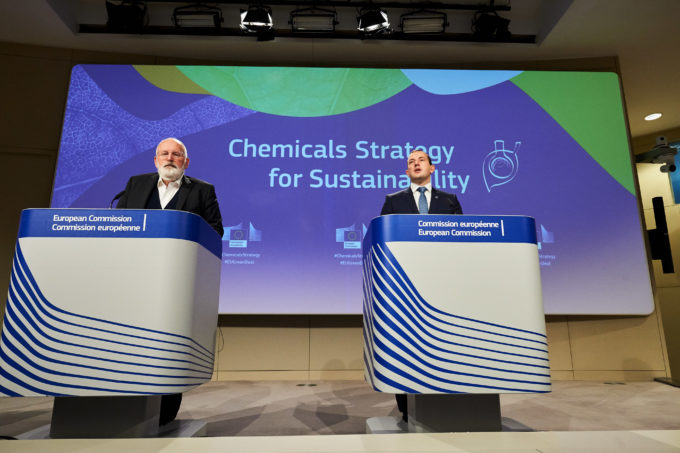
Frans Timmermans and Virginijus SinkeviÄius – European Union, 2020
The EU’s chemicals strategy for sustainability towards a toxic-free environment presented by the European Commission on 14 October 2020 is a flagship initiative under the European Green Deal. It sets out a response to today’s chemicals management challenges which is as groundbreaking as the introduction of the REACH and CLP Regulations was more than a decade ago.
The Chemicals Strategy for Sustainability aims to simplify and strengthen the regulatory framework on chemicals to further increase the level of protection of human health and environment while boosting the competitiveness of the EU chemicals industry.
It will work hand in hand with Biodiversity and Farm to Fork strategies to meet the Zero Pollution Europe ambition of the EU Green Deal, and it will support the delivery of the Circular Economy Action Plan.
At FleishmanHillard EU, our Environment & Chemicals Team conducted a series of interviews with key stakeholders before and after the publication of the Strategy to get their views the top priorities in EU Chemicals policy. Check out our interviews below with Frida Hök of ChemSec, Bjorn Hansen of ECHA, Violaine Verougstraete of Eurometaux, Sylvie Lemoine of Cefic, Henrik Søren Larsen from the Danish Ministry of Environment and Food.
Get in touch with us, if you want to stay ahead on the EU’s Sustainable Chemicals agenda
Get in touch with our Chemicals Practice if you want to stay ahead of these fundamental changes to the business environment for chemical companies and users of chemicals, or if you are seeking to engage to shape the future regulatory context for your sector.
What is in the EU Chemicals Strategy for Sustainability?
The Chemicals Strategy sets out a comprehensive programme of regulatory, legislative and soft initiatives. These are to be carried out in the next 4 years to make the EU’s chemicals policies are fit for 2030.
Reopening of key legislation
The strategy signals a reopening of key pieces of EU legislation, including the REACH Regulation and the Classification and Labelling (CLP) Regulation.
The European Commission will seek to ensure that these are fit to address a series of core priorities. The Regulations should be improved in dealing with endocrine disruptors and the combination effects of chemicals. The safety of Chemicals in products and very persistent chemicals such as PFAS are also priority issues. It will also be key to make the ‘no data, no market’ principle a reality. To this end, the Commission is proposing the potential revocation of dossiers in cases on non-compliance.
Reinforcement of hazard-based approach
Furthermore, the European Commission is seeking to strengthen the hazard-based approach in the EU regulatory framework. Notably, the Chemicals Strategy proposes to make the preventive ‘generic approach to risk management’ the default option. It means that substances of concern, such as carcinogens, would automatically be banned in consumer products, like food contact materials, toys, childcare articles, cosmetics, detergents, furniture and textiles.
Steps to rationalise and simplify EU chemicals rules
The Chemicals Strategy seeks to simplify and rationalise the EU legislative framework for chemicals. It consists of about 40 legislative instruments. The European Commission will introduce a ‘one substance, one assessment’ approach with the support of the European Chemicals Agency (ECHA) and the European Food Safety Authority (EFSA). The approach brings new coordination and transparency in scientific assessments and seeks to strengthen coherence in risk management options. It could also include a redistribution of competences between scientific committees. Changes to regulatory processes, like REACH Authorities and Restriction, are also expected in the context of a reopening of legislation.
Internationalisation of EU rules
With the Chemicals Strategy, the European Commission wants to make the EU’s Chemicals Sector a global leader in Sustainable Chemistry. The transition to a more sustainable model is the key to boost the competitiveness of the EU Chemicals industry. The strategy should drive the necessary innovation by a mix of regulatory requirements, incentives and investments. In this context, boosting the EU’s Strategy autonomy in certain strategic value-chains, like pharmaceuticals, is of new importance after Covid-19. The European Commission will promote the EU’s rules as the ‘gold standard’ world-wide through international agreements and trade deals.
Here’s what policymakers and stakeholders had to say about sustainable chemicals policy in the EU
Frida Hök – Deputy Director at Chemsec
Bjorn Hansen – ECHA Executive Director
Violaine Verougstraete – Chemicals Management Director at Eurometaux
Sylvie Lemoine – Cefic Executive Director Product Stewardship
Henrik Søren Larsen – Head of Department at Ministry of Environment and Food of Denmark
Find Out More
-
Generative AI is changing the search game
May 8, 2025
-
The challenges facing Europe and European leaders at Davos 2025
January 24, 2025


